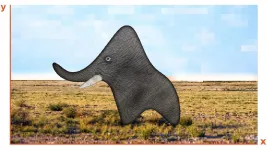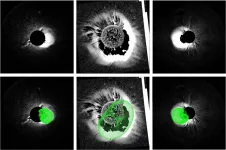(Press-News.org) You would not be surprised to see an elephant in the savanna or a plate in your kitchen. Based on your prior experiences and knowledge, you know that is where elephants and plates are often to be found. If you saw a mysterious object in your kitchen, how would you figure out what it was? You would rely on your expectations or prior knowledge. Should a computer approach the problem in the same way? The answer may surprise you. Cold Spring Harbor Laboratory Professor Partha Mitra described how he views problems like these in a "Perspective" in Nature Machine Intelligence. He hopes his insights will help researchers teach computers how to analyze complex systems more effectively.
Mitra thinks it helps to understand the nature of knowledge. Mathematically speaking, many data scientists try to create a model that can "fit an elephant," or a set of complex data points. Mitra asks researchers to consider what philosophical framework would work best for a particular machine learning task:
"In philosophical terms, the idea is that there are these two extremes. One, you could say "rationalist," and the other "empiricist" points of view. And really, it's about the role of prior knowledge or prior assumptions."
Rationalists versus empiricists
A rationalist views the world through the lens of prior knowledge. They expect a plate to be in a kitchen and an elephant in a savanna.
An empiricist analyzes the data exactly as it is presented. When they visit the savanna, they no more expect to see an elephant than they do a plate.
If a rationalist came across this set of data points in the kitchen, they might at first be inclined to view it as a plate. Their prior knowledge states that a plate is likely to be found in a kitchen; it is highly unlikely to find an elephant. They have never seen this situation before, nor have they ever learned that such a situation could occur. Although their result takes in a certain amount of the data, it leaves out other parts. In this case, their methods have produced an incorrect result: a plate.
When an empiricist sees the same data, they will analyze it without regard to whether they are in the savanna or their kitchen. They will piece together an image from as many data points as possible. In this case, their result is a jagged image. It doesn't tell the empiricist if they are looking at an elephant, a plate, or anything else.
Neither the empiricist nor the rationalist is wrong. Both approaches work for various kinds of problems. However, in this case, if there is an elephant in the kitchen, it would pay to figure it out as quickly as possible. A middle ground between purely empirical and purely rationalist approaches may be best. With some prior knowledge of what an elephant looks like, you may notice the trunk and legs. And although the chances of an elephant being in your kitchen are low, it is certainly not impossible. Therefore, you would come to the conclusion that there is indeed an elephant in your kitchen, and you probably should leave--fast.
Predictable but wrong
Data scientists face this sort of problem all the time. They train computers to recognize new objects or patterns. Some machine learning programs may be able to process a lot of information and make many rules to fit the presented data, like the jagged image above. The jagged image might be reproducible when the same rules are applied to another similar data set. But just because the pattern is reproducible, that doesn't mean it accurately represents what is happening (the elephant).
There are historical examples of this dilemma. Two thousand years ago, Ptolemy developed a model of the universe that yielded excellent predictions for the movements of the moon and planets. His model was used successfully for centuries. However, Ptolemy used the wrong prior information: he placed the Earth at the center of the solar system and prioritized the circular motions of celestial objects. Johannes Kepler questioned this view in the 17th century and ultimately rejected Ptolemy's approach, which eventually led to Newton's law of universal gravitation. Although Ptolemy's complex model fit his own observations exceptionally well, it did not accurately represent what was happening. Mitra warns that "if you want to be an extreme empiricist, you really do need a lot of data. We now understand why under certain circumstances, such an approach can, in fact, succeed in a mathematically rigorous setting. Biological brains, on the other hand, are halfway in between. You do learn from experience, but you're not entirely data-driven."
Mitra hopes that data scientists will look to brain circuitry for inspiration when developing next-generation machine learning approaches. Vertebrate brains have circuits of different sizes, including medium-sized (mesoscale) ones. Those circuits are encoded with priors (known information, such as what animals look like, where they are found, or how to escape quickly from a charging elephant). At the same time, your brain is highly flexible, classifying new information and weighing the importance of different priors based on experience--elephants may not belong in a kitchen, but somehow, you have one anyway. Mitra concludes in his article:
"This points to the possibility of a new generation of intelligent machinery based on distributed circuit architectures which incorporate stronger priors, possibly drawing upon the mesoscale circuit architecture of vertebrate brains."
INFORMATION:
The surface of the sun churns with energy and frequently ejects masses of highly-magnetized plasma towards Earth. Sometimes these ejections are strong enough to crash through the magnetosphere -- the natural magnetic shield that protects the Earth -- damaging satellites or electrical grids. Such space weather events can be catastrophic.
Astronomers have studied the sun's activity for centuries with greater and greater understanding. Today, computers are central to the quest to understand the sun's behavior and its role in space weather events.
The ...
MADISON, Wis. -- For birds and other wildlife, winter is a time of resource scarcity. Extreme winter weather events such as a polar vortex can push some species to the edge of survival. Yet winter tends to get short shrift in climate change research, according to UW-Madison forest and wildlife ecology Professor Ben Zuckerberg.
"When we think about the impact of climate change, winter tends to be overlooked as a time of year that could have significant ecological and biological implications," says Zuckerberg. "It makes me, and my colleagues, think quite deeply about the impacts of these extreme events during this time when species are particularly vulnerable."
Zuckerberg, ...
Using a piece of magnet, researchers have designed a simple system that can control the movement of a small puddle of water, even when it's upside down. The new liquid manipulation strategy, described in the journal Cell Reports Physical Science on June 3, can have a wide range of applications including cleaning hard-to-reach environments or delivering small objects.
Previous attempts to control the movement of fluids often relied on special platforms. For example, on a surface that has one section more hydrophobic than another, water will spontaneously ...
Anyone that's ever interacted with a dog knows that they often have an amazing capacity to interact with people. Now researchers reporting in the journal Current Biology on June 3 have found that this ability is present in dogs from a very young age and doesn't require much, if any, prior experience or training. But, some of them start off better at it than others based on their genetics.
"We show that puppies will reciprocate human social gaze and successfully use information given by a human in a social context from a very young age and prior to extensive experience with humans," said Emily E. Bray of the University of Arizona, Tucson. "For example, even before puppies have left their littermates to live ...
Whales are largely protected from direct catch, but many populations' numbers still remain far below what they once were. A study published in the journal Current Biology on June 3 suggests that, in addition to smaller population sizes, those whales that survive are struggling. As evidence, they find that right whales living in the North Atlantic today are significantly shorter than those born 30 to 40 years ago.
"On average, a whale born today is expected to reach a total length about a meter shorter than a whale born in 1980," said Joshua Stewart of the National Oceanic and Atmospheric Administration (NOAA) in La Jolla, CA. That represents an average decline in length of about 7%. "But that's just the average--there are also some extreme cases where young whales are several ...
Patients who, perhaps unbeknownst to their health care providers, are in need of genetic testing for rare undiagnosed diseases can be identified en masse based on routine information in electronic health records (EHRs), a research team reported today in the journal Nature Medicine.
Findings from the Vanderbilt University Medical Center study suggest that, among the patients of any sizeable health care system, there are hundreds or thousands with undiagnosed rare diseases of the sort where a genetic test could lead to a diagnosis.
"Patients with rare genetic diseases often face ...
What The Study Did: Changes in pregnancy and birth rates before and after COVID-19 lockdown measures were estimated using electronic medical records.
Authors: Molly J. Stout, M.D., of the University of Michigan in Ann Arbor, is the corresponding author.
To access the embargoed study: Visit our For The Media website at this link https://media.jamanetwork.com/
(doi:10.1001/jamanetworkopen.2021.11621)
Editor's Note: Please see the article for additional information, including other authors, author contributions and affiliations, conflict of interest and financial disclosures, and funding and support.
INFORMATION:
Media advisory: The full study is linked to this news release.
Embed this link to provide your readers free access ...
Quantum computers with their promises of creating new materials and solving intractable mathematical problems are a dream of many physicists. Now, they are slowly approaching viable realizations in many laboratories all over the world. But there are still enormous challenges to master. A central one is the construction of stable quantum bits - the fundamental unit of quantum computation called qubit for short - that can be networked together.
In a study published in Nature Materials and led by Daniel Jirovec from the Katsaros group at IST Austria in close collaboration with researchers from the L-NESS Inter-university Centre in Como, Italy, scientists now have created a new and promising candidate system for reliable qubits.
Spinning Absence
The researchers created the qubit using the ...
Dogs may have earned the title "man's best friend" because of how good they are at interacting with people. Those social skills may be present shortly after birth rather than learned, a new study by University of Arizona researchers suggests.
Published today in the journal Current Biology, the study also finds that genetics may help explain why some dogs perform better than others on social tasks such as following pointing gestures.
"There was evidence that these sorts of social skills were present in adulthood, but here we find evidence that puppies - sort of like humans - are biologically prepared to interact in these social ways," said lead study author Emily Bray, a postdoctoral research associate in the UArizona School of Anthropology in the College of Social and Behavioral ...
(Toronto, June 3, 2021) -- The impact of deploying Artificial Intelligence (AI) for radiation cancer therapy in a real-world clinical setting has been tested by Princess Margaret researchers in a unique study involving physicians and their patients.
A team of researchers directly compared physician evaluations of radiation treatments generated by an AI machine learning (ML) algorithm to conventional radiation treatments generated by humans.
They found that in the majority of the 100 patients studied, treatments generated using ML were deemed to be clinically acceptable for patient treatments by physicians.
Overall, 89% of ML-generated treatments were considered clinically acceptable for treatments, ...







